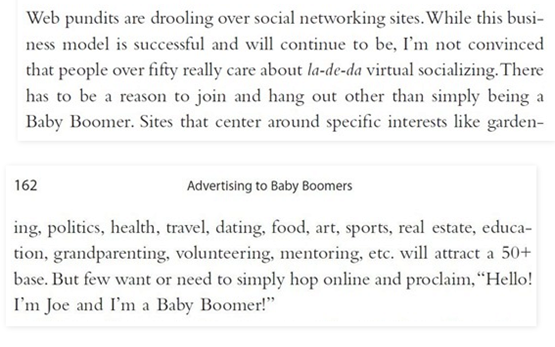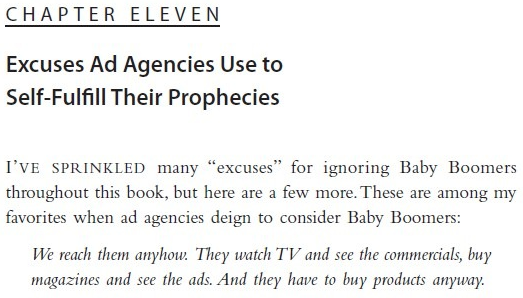I didn’t get around to blogging about some no news news when it wasn’t news a week or so ago. Now is as late a time as any:
Top retail products being sold to Baby Boomers
Baby boomers are responsible for nearly half of all consumer-packaged goods (CPGs) purchases, according to Nielsen’s August 2012 findings. CPGs include products ranging from foods and drinks, to health and beauty products, to household and pet products.
So along with the obvious stuff, Boomers purchase just about everything else. Sounds familiar:
14 December 2008
Baby Boomers: A Force to Reckon WithHouseholds with baby boomer members -- born between 1946 and 1964 -- account for nearly $230 billion in sales of consumer packaged-goods (CPG) products and represent 55 percent of total CPG sales…
16 September 2009
Boomer Backlash IIThe Real Issue: Marketing and advertising folks grasping the fact that Boomers will be buying billions (trillions?) of dollars worth of non-age related products for the next twenty-odd years. If you target this group for toothpaste, computers, clothes, food, nail polish, sporting equipment, toenail clippers - anything at all (almost), and you do it with respect and finesse, they will appreciate and consider your product.
Automobiles:
Boomers Replace Their Children as No. 1 Market for Autos
The 55-to-64-year-old age group, the oldest of the boomers, has become the cohort most likely to buy a new car…
Sounds familiar:
12 March 2009
Who’s gonna buy this car?
In 2005 on The Advertising Show yours truly had a spirited discussion with hosts Brad Forsythe and Ray Schilens. A chunky segment was about marketing autos to Boomers.
03 May 2012
67% Of All Sales…
I haven’t invoked NostraChuckus in awhile. He’s that Great Seer of The Obvious and The Mundane.
More no news news:
'Selfish' Baby Boomers Give Way More to Charity Than Gen X or Gen Y
… Baby boomers account for 43% of all charitable giving in the U.S., far and away the largest amount given by the four demographic measured in the study.
Sounds familiar:
Me vs. We 11 February 2008
Me vs. We Redux 26 June 2009
Me vs. We Redux Redux 22 October 2009
 Or …
Or …
Consider this post prophetic, for there will be much more of the same no news news in the future.
»»» Update 15 August 2013
Looks like The Wall Street Journal has finally caught up to what I’ve been saying since 2005:
Who's Buying 'Youth' Cars? Seniors
Boomers Are Prime Buyers for Small Vehicles That Auto Makers Target at Hipsters


 So the bakers’ and millers’ lobby put together a national campaign:
So the bakers’ and millers’ lobby put together a national campaign:





 You’ve turned 50? Congratulations!
You’ve turned 50? Congratulations! …Plan an issue with no age/malady related ads…Of course, I would leave editorial in the expert hands of Ms. Blyth and others – but might suggest this: For one issue, no articles about being old or sick…
…Plan an issue with no age/malady related ads…Of course, I would leave editorial in the expert hands of Ms. Blyth and others – but might suggest this: For one issue, no articles about being old or sick… I often invoke alter-ego
I often invoke alter-ego 






 I’m on the list.
I’m on the list. I know something about the brain book/game industry:
I know something about the brain book/game industry: